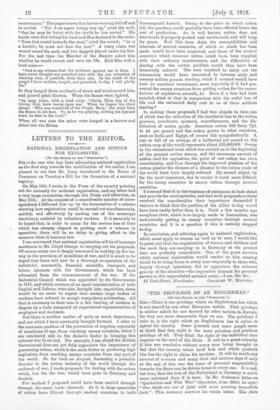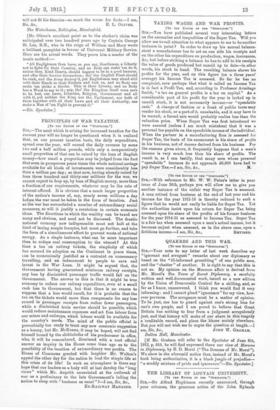"THE PRIVILEGE OF AN ENGLISHMAN."
LT° rue ED/TOR OP Tun " SPIWTATOIL,"j San,—There is one privilege which an Englishman has which is not shared by any other European nation. That privilege is neither asked for nor desired by other nations in Europe, for they are more democratic than we are. The privilege I refer to is the right which an Englishman has to refuse to, defend his country. Some journals and some people seem to think that this right is the most priceless and precious privilege of all. They think the right of the individual rises superior to the need of the State. It will be a great calamity if this war concludes without every man being brought to feel that the country which bred him and which protects him has the right to claim his services. It will be worth any amount of reverses and many dark and anxious days if only at the end of this war the sense of personal responsibility towards the State can be driven home to every one. It is sad, but true, that the love of the Fatherland in Germany is much more universal than it is here. In Mr. Graham's letter on "Quakerism and This War" (Spectator, June 26th) he says : " Our ideals are out of joint with some pressing immediate facts." This sentence answers his whole letter. The facts
will not fit his theories—so much the worse for facts.—I am, The Waterhouse, Bollington, Macclesfield.
[Mr. Oliver's excellent point as to the slacker's claim was anticipated over two hundred years ago by Captain George St. Loe, R.N., who in the reign of William 'and Mary wrote a brilliant pamphlet in favour of Universal Military Service. Here are his actual words. They prove him a master of the
ironic method :—
"All Engli4hmen then have, as you say, Gentlemen, a Liberty not to fight for their Country, and no Body can mako 'em do it, unless they, Kind Hearts, should happen to be in a good humour, and offer their Service themselves ; tho' the English Fleet should be sunk, and the Army destroy'd, yet Englishmen may stand still with their Hands in their Pockets and look on, and no Body can make 'om strike a Stroke. This is their Liberty, and no Body has a Word to say to it ; nay, tho' the Kingdom itself wore sure to be lost, our Laws, Liberties, Religion, Government and all with it, yet neither the King nor the Parliament., nor both of them together with all their Laws and all their Authority, can make a Man of 'em Fight to prevent it."
—En. Spectetor.1











































 Previous page
Previous page